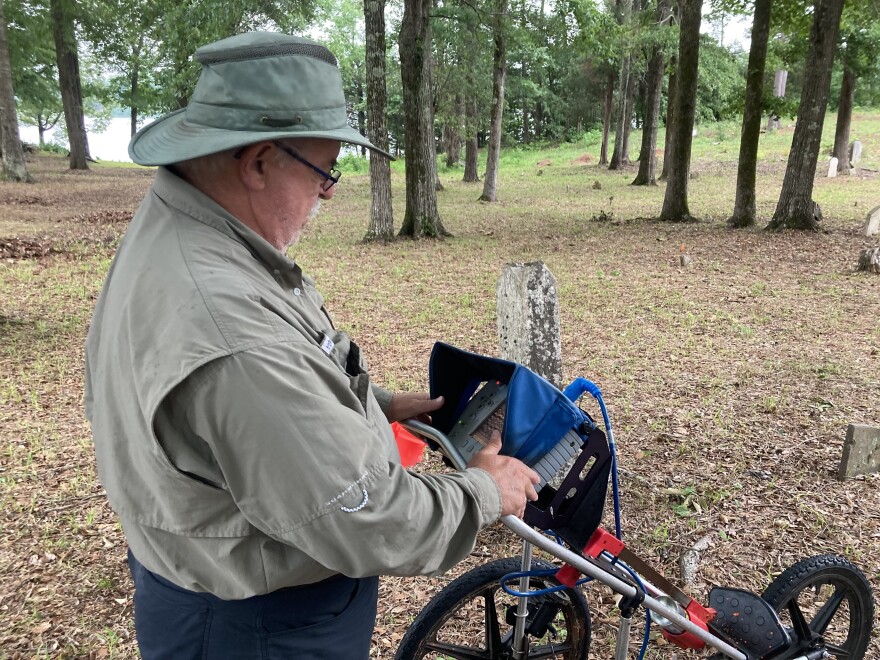The National Association of Black Journalists honored the Alabama Public Radio news team with a national “Salute to Excellence” award. The recognition, for First Place Radio Feature, was for APR’s eight-month investigation “No Stone Unturned: Preserving Slave Cemeteries in Alabama.” The honor was announced during the NABJ National convention in Birmingham.
“No Stone Unturned” began with the “forty unknown graves.” APR arranged for the first ever ground penetrating radar scan of the Old Prewitt Slave cemetery near Tuscaloosa. A preliminary survey uncovered forty unmarked and unknown graves. Len Strozier of Omega Mapping Services agreed to scan the two-acre site, set aside by slave holder John Welch Prewett in the 1820’s. He found the first of forty unmarked graves within a minute of scanning.

“Right now, I see an air pocket where a body was buried in the ground,” Strozier told APR. “As the body is placed in the ground. If it’s not embalmed, or protected with a vault, it all breaks down, It degrades…decomposes—including the wooden casket.”
Strozier estimated a more thorough examination of the Old Prewett Slave Cemetery would uncover up to two hundred more unknown graves, which he referred to as “unmarks.”
“No Stone” interviewees like Ethel Alexander, of the Birmingham African American Genealogy Group patiently explained the anguish and indignity African Americans face when trying to find their ancestors. If these people were kidnapped Africans, they wouldn’t be listed in the U.S. Census before 1870. Alexander said this situation is further complicated by the fact that slaves were often buried without caskets, a vault, or a grave marker, so even if a family found the spot where a loved one was buried, it might not help.
“They may not see anything but a rock,’ Alexander explained to APR. “They may not see nothing but tree. You know, you’re not going to be to say ‘oh, there’s my grandfather…great, great, great slave.’”
During the NABJ award ceremony APR was honored alongside other organizations, including the CBS’ news magazine 60 Minutes. Reporter Scott Pelley led the investigation titled “Grave Injustice,” while followed a similar angle to APR’s “No Stone Unturned” program.

“No one can say when human remains began surfacing in Clearwater, Florida,” Pelley reported. “There was the pipeline crew that churned up bones in a trench. Later, remains of the dead were found at an elementary school, a swimming pool, and an office building. It seemed like something of a curse for what had been done in the name of progress-and greed-in the old-segregated south. As we first reported last fall, the truth of what happened in the '40s and '50s was meant to stay buried, but in a neighborhood called Clearwater Heights, residents with long memories recognized a grave injustice.”
Other honorees during the NABJ event included the Chicago Tribune, NBC-TV, ESPN, NPR, MSNBC, and The Canadian Broadcasting Company.
APR’s “Salute To Excellence” award follows an international Gabriel Award from the Catholic Media Association for best local radio documentary. This year’s honorees including PBS producer Ken Burns his documentary on the U.S. and the Holocaust. The judges in that competition said of “No Stone” that they were…
“…absolutely captivated, frustrated, sad, and inspired all at once. It was a shocking realization listening to family members of slaves whose bodies are still being discovered. Well presented in a revealing story about unmarked burial sites for enslaved people.”
APR also received three regional Edward R. Murrow awards, for Best Documentary, Best Series, and Excellence in Writing. “No Stone” was also recognized with “Radio Best in Show” during the Society of Professional Journalists’ Green Eyeshade Awards, which are the are the oldest regional journalism awards in the U.S., including top media markets like Miami and Atlanta.






